

Employability skills for today. Self-management is broadly defined as the ability to intentionally and strategically manage one’s emotions, behavior, effort, and environment in the pursuit of goals.
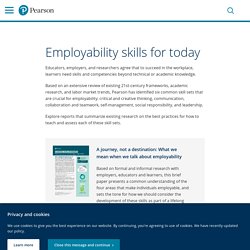
The terminology used to refer to self-management or its component skills (e.g., self-control, self-discipline, self-regulation, self-regulated learning, effortful control, and willpower) varies across disciplines. Through careful evaluation of discipline-specific terms and definitions across several different fields, Pearson has defined self-management as consisting of six core skills: Employability skills for today. Why ‘worthless’ humanities degrees may set you up for life - BBC Worklife. Do what you love This is a big part of why there is one major takeaway, says Mangan.

Whatever a student pursues in university, it must be something that they aren’t just good at, but they really enjoy. “In most areas that I can see, the employer just wants to know that you’ve been to college and you’ve done well. That’s why I think doing something that really interests you is essential – because that’s when you’re going to do well,” she says. No matter what, making a degree or career path decision based on average salaries isn’t a good move. Best Soft Skills to Boost Your Career. What Workplace Skills Will Your Children Need? - SCANS Skills. How to recognise your transferable skills. L-R: Jenna Stevens-Smith, Tom Weller, Elizabeth Bohm Creit: Lisa Restelli Contributor Lisa Restelli Elizabeth Bohm is a policy advisor at the Royal Society.
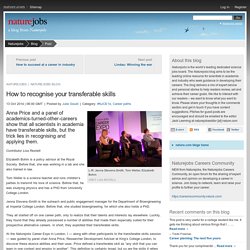
Before that, she was working in a lab and she also trained in law. Tom Weller is a science teacher and runs children’s parties to transmit his love of science. Jenna Stevens-Smith is the outreach and public engagement manager for the Department of Bioengineering at Imperial College London. They all started off on one career path, only to realize that their talents and interests lay elsewhere.
At the Naturejobs Career Expo in London, I — along with other participants to the transferable skills session — was guided by panel chair Anna Price, Researcher Development Adviser at King’s College London, to discover these elusive abilities and their uses. Starting Your Self-Assessment. In the course of pursuing your graduate degree, you will develop a range of skills in addition to your disciplinary expertise.
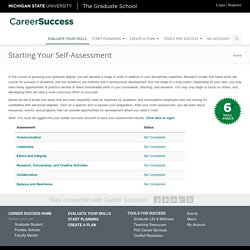
Research shows that these skills are crucial for success in academic and non-academic job markets and in professional development over the range of a long career. Depending on your field, you may have many opportunities to practice several of these transferable skills in your coursework, teaching, and research. You may only begin to touch on others, and developing them will take a more conscious effort on your part. Below are the 6 broad skill areas that are most frequently cited as important by academic and nonacademic employers who are looking for candidates with advanced degrees. Click on a specific skill to assess your preparation. Integration: New Skills Profile tool to help non-EU nationals enter the labour market.
It is an off – and online web editor that will make it possible for non-EU nationals to present their skills, qualifications, and experiences in a way that is well understood by employers, education and training providers and organisations working with migrants across the whole European Union.
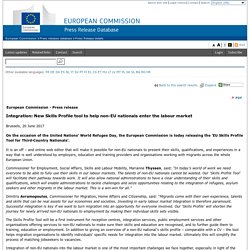
Commissioner for Employment, Social Affairs, Skills and Labour Mobility, Marianne Thyssen, said: "In today's world of work we need everyone to be able to fully use their skills in our labour markets. The talents of non-EU nationals cannot be wasted. Our 'Skills Profile Tool' will facilitate their pathway towards work. “Personal kanban”: a time-management system that explodes the myth of multitasking — Quartz. Multitasking is probably the single most overrated skill in modern life.
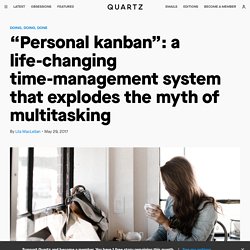
It drains your brain of oxygenated glucose that could be put toward paying more focused attention, makes it difficult for a person to switch between tasks, and is generally an illusion anyway. Only 3% of the population are “supertaskers,” according to a study from Ohio University. The rest of us just pretend to be. A number of systems have been developed to save us from our endless to-do lists, which can turn any job into a soulless assembly line of chores. One such system is “Personal Kanban,” which was named for the Japanese concept that inspired it, a just-in-time manufacturing process developed at Toyota in the late 1940s. In an industrial setting, Kanban (which means “signboard” or “billboard” in Japanese, as a recent Medium post explains) relies on tickets that move with each product through a plant.
Euraxess.eventiotic. 7 Things comedians can teach you about public speaking. Tribal Group Plc. Cost effective: It's a scalable solution whether you have 500 or 500,000 students - SITS:Vision is the right fit.
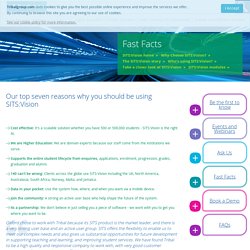
We are Higher Education: We are domain experts because our staff come from the institutions we serve. Supports the entire student lifecycle from enquiries, applications, enrolment, progression, grades, graduation and alumni. 140 can't be wrong: Clients across the globe use SITS:Vision including the UK, North America, Australasia, South Africa, Norway, Malta, and Jamaica. Data in your pocket: Use the system how, where, and when you want via a mobile device.
Join the community: A strong an active user base who help shape the future of the system. Its a partnership: We don't believe in just selling you a piece of software - we work with you to get you where you want to be. Oxford chose to work with Tribal because its SITS product is the market leader, and there is a very strong user base and an active user group. What does SITS stand for?
Standard Chartered Graduate Programmes - Discover your strengths, passions & ambitions. A Virtual Career Center for California Community College Students - CA Career Cafe. Businessinsider. Emotional Intelligence is a Must Have for Many Employers. 6 Interview Questions to Test for Emotional Intelligence By Zane Bacic on June 20, 2016 Emotional Intelligence is a Must Have for Many Employers.
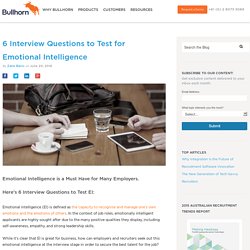
Here’s 6 Interview Questions to Test EI: Emotional intelligence (EI) is defined as the capacity to recognise and manage one’s own emotions and the emotions of others. In the context of job roles, emotionally intelligent applicants are highly sought after due to the many positive qualities they display, including self-awareness, empathy, and strong leadership skills. While it’s clear that EI is great for business, how can employers and recruiters seek out this emotional intelligence at the interview stage in order to secure the best talent for the job? To make this challenging task easier, we’ve put together six interview questions designed to uncover the emotional intelligence of your candidates. Question: Describe a time when you were faced with a problem that required an immediate solution.What it shows: Problem-solving skills.